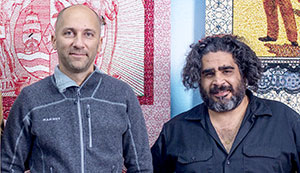
“Bittersweet” curators Jose Falconi and Santiago Montoya.
By Ryan DiLello
On Monday evening, I had the pleasure of interviewing Jose Falconi and Santiago Montoya, the curators of a recent exhibit at the Somerville Museum, titled Bittersweet. Originally from Peru, Falconi is a Professor of Art and Human Rights at the University of Connecticut. Santiago Montoya is a Colombian artist and entrepreneur.
Bittersweet is the latest installment of a project which the artists began in Colombia under the title El Dorado Chocolaterie, a reference to the mythical gold-covered city that expeditionists sought throughout the 16th century.
And while the promises of hot chocolate, cacao-infused sweets, and hand-made ceramics were sufficient to draw a crowd, it was the idea of a promise itself that Falconi and Montoya hoped to lay bare for audiences to reflect on.
“We are charging promises,” Falconi said. “If you want a cup of cacao, you have to make a promise to the city of Somerville. The currency is the promise itself.”
Promises are important to Falconi and Montoya, especially unfulfilled ones.
“Colombia is not a failed state, but it has a long, long, history of unfulfilled promises,” Falconi said. “Unfulfilled, clearly because of the material conditions in the country. You may have it written, but it is not honored. In Latin America, there is a heightened sensation around those [unfulfilled promises], especially in Colombia. In [the United States], you are beginning to really live in that way – when you realize all the promises of democracy, voluntaryism, equality, haven’t really been fulfilled for a certain part of the population. But that very sensation [of unfulfillment] is pervasive in the region [Colombia].”
The effects of unfulfilled promises are impossible to constrain to political life, and not just in Colombia. For promises are the very mechanism by which people conduct their social lives. From managing schedules, to buying goods, to setting goals for ourselves – “at any exchange level, there is a promise inherent.” Falconi said.
And from time to time, we break promises. Plans change, we forget commitments, and sometimes we fall short of our goals. The same dynamic extends from the individual to a globalized level of exchange, policy, and diplomacy. “There is deep fragility,” Falconi said.
On many occasions throughout Latin American history, the fragile values that uphold promises have buckled to capitalistic impulses for the extraction and consumption of commodities, Montoya explained. Montoya’s artistic background explores currency, the pieces of paper which we promise value to, by the Federal Reserve.
“The globalization of the economy, that comes precisely from Potosi, where the abundance of silver made it possible to have an economy that was more widely accepted,” Montoya explained.
And as the global economy grew, Latin America served as a hotbed for particularly valuable commodities.
“Rushes have not just been accessory to the economic system of Colombia; they have been structural,” Falconi explained.
“We’re talking from the exploration of the country itself, produced by the rush of gold,” Falconi said. “But then you had quinine in the colonial period which recently made a very interesting appearance with Trump trying to promote it as a drug with COVID, then you had rubber, then you had emeralds, you had cocaine. All of those things have been important ways in which the economy has articulated itself and produced a very particular culture in the way in which it articulates itself.”
Falconi and Montoya informed me that they have hosted several exhibits in the past, exploring each of these rushes with thought-provoking experiences. Now in Somerville, “the capital of candy,” the artists are investigating the city’s history of chocolate-making, an industry deeply embedded in slavery and the slave trade.
The exhibit is called Bittersweet – a word that reflects the combination of bitter cacao with sweet sugar to make chocolate, and a word that juxtaposes the sensual pleasure of an indulgence and the bitter history of consequences.
Catch the next event in the Bittersweet project, Thursday, February 17, at 6:00 p.m. on Zoom. Register and learn more at: https://www.somervillemuseum.org/bittersweet.















This is a beautiful series. Thank you for bringing your art and insights to Somerville.